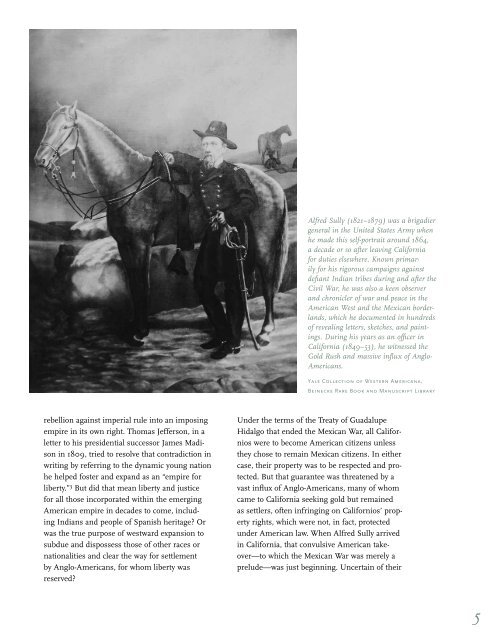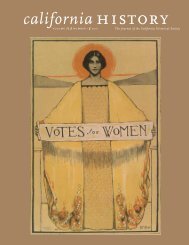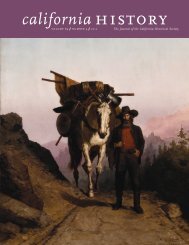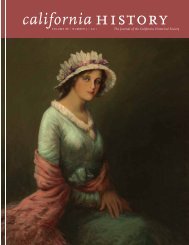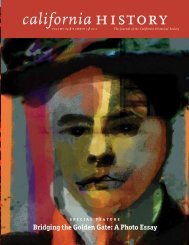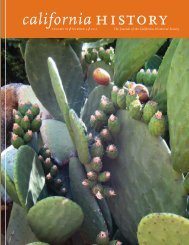Volume 90, Number 1 - California Historical Society
Volume 90, Number 1 - California Historical Society
Volume 90, Number 1 - California Historical Society
Create successful ePaper yourself
Turn your PDF publications into a flip-book with our unique Google optimized e-Paper software.
ebellion against imperial rule into an imposing<br />
empire in its own right. Thomas Jefferson, in a<br />
letter to his presidential successor James Madison<br />
in 1809, tried to resolve that contradiction in<br />
writing by referring to the dynamic young nation<br />
he helped foster and expand as an “empire for<br />
liberty.” 3 But did that mean liberty and justice<br />
for all those incorporated within the emerging<br />
American empire in decades to come, including<br />
Indians and people of Spanish heritage? Or<br />
was the true purpose of westward expansion to<br />
subdue and dispossess those of other races or<br />
nationalities and clear the way for settlement<br />
by Anglo-Americans, for whom liberty was<br />
reserved?<br />
Alfred Sully (1821–1879) was a brigadier<br />
general in the United States Army when<br />
he made this self-portrait around 1864,<br />
a decade or so after leaving <strong>California</strong><br />
for duties elsewhere. Known primarily<br />
for his rigorous campaigns against<br />
defiant Indian tribes during and after the<br />
Civil War, he was also a keen observer<br />
and chronicler of war and peace in the<br />
American West and the Mexican borderlands,<br />
which he documented in hundreds<br />
of revealing letters, sketches, and paintings.<br />
During his years as an officer in<br />
<strong>California</strong> (1849–53), he witnessed the<br />
Gold Rush and massive influx of Anglo-<br />
Americans.<br />
Yale Collection of Western Americana,<br />
Beinecke Rare Book and Manuscript Library<br />
Under the terms of the Treaty of Guadalupe<br />
Hidalgo that ended the Mexican War, all Californios<br />
were to become American citizens unless<br />
they chose to remain Mexican citizens. In either<br />
case, their property was to be respected and protected.<br />
But that guarantee was threatened by a<br />
vast influx of Anglo-Americans, many of whom<br />
came to <strong>California</strong> seeking gold but remained<br />
as settlers, often infringing on Californios’ property<br />
rights, which were not, in fact, protected<br />
under American law. When Alfred Sully arrived<br />
in <strong>California</strong>, that convulsive American takeover—to<br />
which the Mexican War was merely a<br />
prelude—was just beginning. Uncertain of their<br />
5


